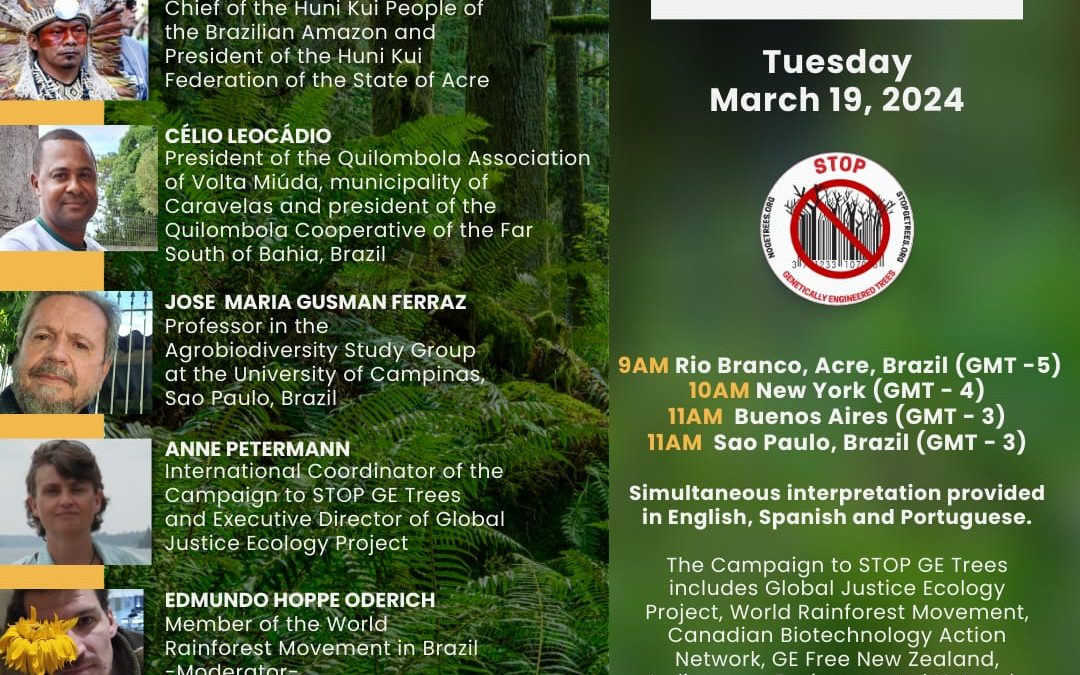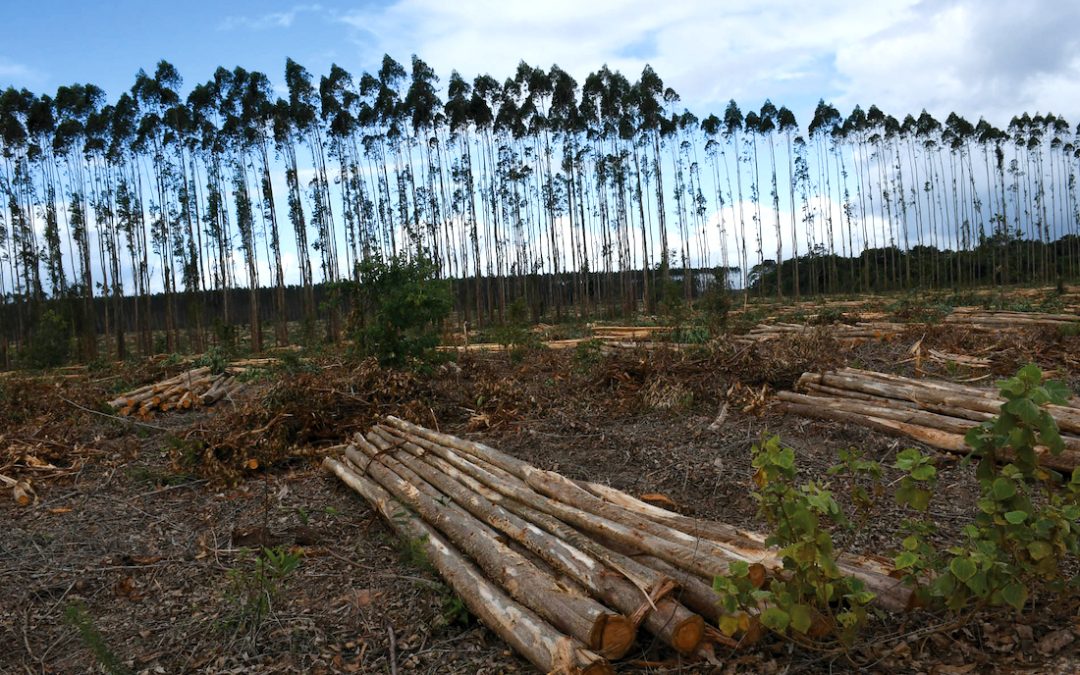Brazil Campaign
Updates
Farmers murder Pataxó indigenous woman
On January 22, 2024 https://www.servindi.org/ published the article “Farmers murder Pataxó indigenous woman”. The article can be read on the servindi.org website.
Webinar: Resisting land grabs for eucalyptus plantations in Brazil
Webinar (October 2023): The National Farmers Union in Canada (NFU) hosted a webinar to hear from Quilombola community leaders in the Atlantic Forest biozone of Brazil who are fighting to grow food for their families and communities in direct resistance to the expansion of destructive eucalyptus tree plantations controlled by the major pulp company Suzano. Click here for more information.

Alert against Green Deserts Network / Alerta Contra Desertos Verdes
Open Letter (September 2023): The “Alert against Green Deserts” network met in Brazil as part of the International Day of Struggle against Monoculture Tree Plantations. Members of different states and representatives of quilobola communities, fishermen and agrarian reform settlements participated. Following the meeting the network released an open letter denouncing the impacts of plantations and the crimes committed by the companies. They also demand reparation and reaffirm resistance against tree monocultures. The letter can be read in Portuguese on the Alert against Green Deserts’ website and in English here.

World Rainforest Movement
Bulletin (October 2023): The World Rainforest Movement released a bulletin “Communities from Brazil and Mozambique exchange experiences in the fight against industrial tree plantations” which can be read in full on the World Rainforest Movement’s website.
Report (August 2023):The World Rainforest Movement released a 20 page report entitled “What you need to know about Suzano Papel e Celulose”. The report can be found on the World Rainforest Movement’s website in English, French, Spanish, and Portuguese.

A recent effort by Brazilian lawmakers would be disastrous for Indigenous land claims
October 2023: A recent effort by Brazilian lawmakers would be a disaster for Indigenous land claims and efforts to protect the Amazon rainforest, as reported on the Grist website. Following Brazil’s Supreme Court September 2023 rule that marco temporal ( a legal theory supported by Brazil’s agribusiness sector that would have limited Indigenous claims to land and opened those territories to extractive industries like mining and agriculture) was unconstitutional, “Brazilian lawmakers approved legislation that would make marco temporal legal anyway, putting Indigenous lands and communities at risk again”.
The following are excerpts from the article:
-
With passage, the law would mark a specific time for when Indigenous land claims could be accepted: If Indigenous communities weren’t on the land they claimed in 1988 — when the Brazilian constitution was passed — they would have no claims to those lands, opening them up for development.
-
A coalition of seven Indigenous Brazilian organizations have sent an appeal to the United Nations denouncing violence against Indigenous peoples and warning that the approval of the marco temporal bill could lead to more. They have also urged President Luiz Inácio Lula da Silva to veto the bill.
-
The bill now awaits Lula’s approval or veto, but even with a veto, lawmakers can override it with a majority vote in each chamber.
Note: In May 2023 Kleber Karipuna, head of the Coordination of Indigenous Organizations of the Brazilian Amazon, gave an interview to the Campaign to Stop GE Trees about this issue
Recently Circulated Protest Letters
Brazil groups say NO to GE trees: Sign on letter (Deadline – June 19, 2022)
Letter from the Alert Against the Green Deserts Movement in Brazil denouncing tree plantations and GE trees (2022). (Portuguese and English)
World Bank affiliate IFC approves loan for Suzano’s unsustainable project in Cerrado, ignoring warning from 40+ environmental groups. Environmental Paper Network (2022). (Available in Portuguese and English through Google Translate)
News
2023 Top News Stories
Historic Victory for Brazil: In what can be seen as a historic victory for the South American country’s original inhabitants, Brazil’s supreme court has blocked an attempt to drastically strip back Indigenous land rights. As reported in The Guardian, “Nine of the court’s 11 members voted against what rights groups had dubbed the “time limit trick” – an agribusiness-backed attempt to prevent Indigenous communities claiming land they did not physically occupy in 1988… …Many Indigenous groups were driven from their ancestral lands during Brazil’s 21-year military dictatorship which ended in 1985.” (September 2023)
Congratulations to the Agroecology School Egidio Brunetto for its 10th anniversary and for advancing the agroecological transition in the Atlantic Forest Biome! NOTE: This is the MST school that the Campaign to STOP GE Trees visited in May-June 2023 (August 23, 2023)
Greenwashing: Is the Brazil paper company sustainable? (June 22, 2023, Deutsche Welle (DW))
Indigenous groups turn to Brazil’s highest court to stop police violence (June 9, 2023, Mongabay)
U.S. conservation investment routed to eucalyptus expansion in Brazil’s Cerrado (June 6, 2023, Mongabay)
The Role of Eucalyptus in Brazil comes under the Crosshairs of the International Anti-Transgenic Tree Network (June 2, 2023, FASE) *originally posted in Portuguese and available in English through Google Translate
Outrage as Brazil law threatening Indigenous lands advances in congress (May 31, 2023, The Guardian)
Brazilian Indigenous groups protest as lawmakers approve bill limiting recognition of ancestral lands (May 31, 2023, CNN)
Jerônimo Rodrigues, Governor of Bahia, denied the National Force’s help in protecting the Pataxó People (February 16, 2023, Articulation of Indigenous Peoples of Brazil) *originally posted in Portuguese and available in English through Google Translate
Against Eucalyptus Monoculture, MST occupies three areas of Suzano Papel e Celulose. (February 27, 2023, Brasil de Fato) *originally posted in Portuguese and available in English through Google Translate
A Worrying Future for River Flows in the Brazilian Cerrado Provoked by Land Use and Climate Changes (27 February, 2023, MBPI)
Plan fails, Ribas repeats Três Lagoas and is on the verge of collapse with the creation of 10,000 jobs (February 12, 2023, O Jacare) *originally posted in Portuguese and available in English through Google Translate
“We are on the verge of chaos”, complains mayor of Ribas (Februray 9, 2023, RCN 67) *originally posted in Portuguese and available in English through Google Translate
Latest News

Upcoming Webinar: Tuesday March 19 – Emergency of GE Trees for Indigenous Peoples
Tuesday March 19, 2024 9AM Rio Branco, Acre, Brazil (GMT -5) 10AM New York (GMT - 4) 11AM Buenos Aires (GMT - 3) 11AM Sao Paulo, Brazil (GMT - 3)Zoom Link (further information below): https://us02web.zoom.us/j/87230883466~ Interpretation provided in English,...

Rachel Parent at COP 28
Rachel Parent is at the COP 28, in cooperation with the Global Justice Ecology Project, to help stop genetically engineered (GE) trees. What is COP 28? UN Climate Change conferences (or COPs) happen every year. COP 28 refers to the United Nations Climate Change...

Brazil: Open Letter from the “Alert against Green Deserts” Network
In September 2023, The Alert against Green Deserts" network met in Brazil as part of the International Day of Struggle against Monoculture Tree Plantations. Members of different states and representatives of quilobola communities, fishermen and agrarian reform...

World Rainforest Movement: Communities from Brazil and Mozambique exchange experiences in the fight against industrial tree plantations
Note: The following was originally published in the World Rainforest Movement‘s in-depth October 2023 Bulletin. We highly encourage you to check it out. Exchanges between those who fight to defend their territories are crucial in helping connect and strengthen...

New Study: Glyphosate and Fluoride in High-Hardness Drinking Water Are Positively Associated with Chronic Kidney Disease of Unknown Etiology (CKDu) in Sri Lanka
Note: Glyphosate is the chemical found in the commonly used pesticide Roundup. The Campaign to STOP GE Trees is working to stop Suzano's glyphosate-tolerant GE Eucalyptus trees in Brazil. A new paper Glyphosate and Fluoride in High-Hardness Drinking Water Are...

GRIST: A recent effort by Brazilian lawmakers would be disastrous for Indigenous land claims
October 2023: A recent effort by Brazilian lawmakers would be a disaster for Indigenous land claims and efforts to protect the Amazon rainforest, as reported on the Grist website. Following Brazil’s Supreme Court September 2023 rule that marco temporal ( a legal...

